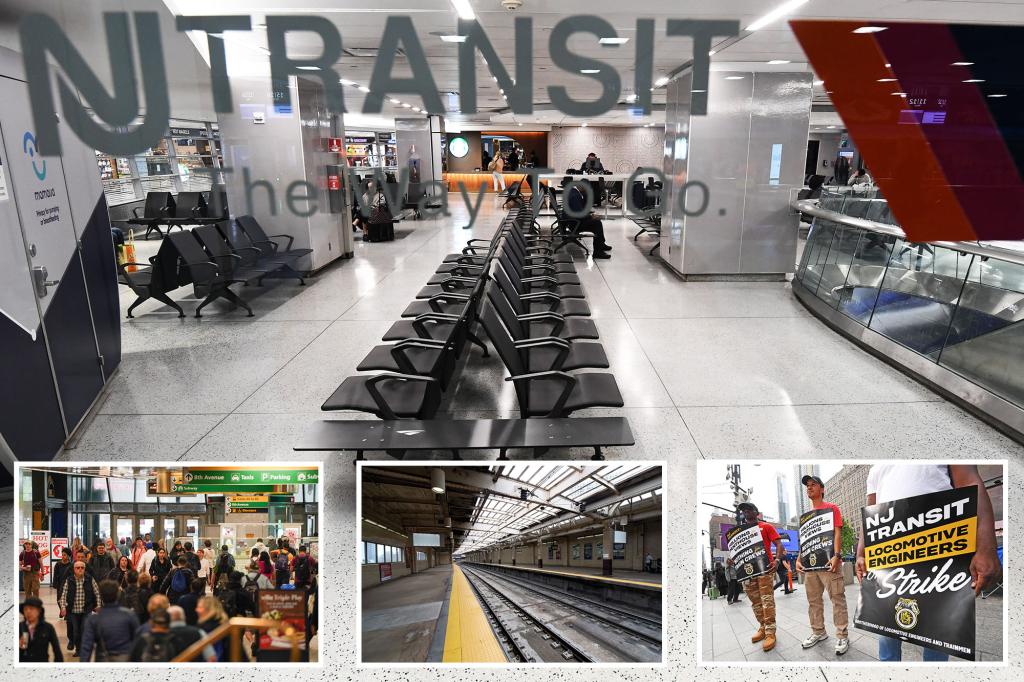Last call for the ghost train to Jersey.
Normally bustling transit terminals were eerily empty Friday as NJ Transit engineers went on strike, bringing rail services across the state to a grinding halt and leaving hubs like Penn Station in New York eerily devoid of Garden State travelers.
The platforms at the Manhattan transit stop had a post-apocalyptic feel during the early Friday rush hour after the NJ Transit engineers walked off the job over a pay dispute, triggering the first strike to hit the major transport system in more than 40 years.
The strike — which left roughly 350,000 commuters in the lurch — left scores of train terminals in the Garden State, including the Harrison PATH station, virtually bare, too, as people relied on buses, cars, taxis and boats to get to work.
“I left home very early because of it,” David Milosevich, a fashion and advertising casting director, said as he arrived at Midtown’s Port Authority Bus Terminal from Montclair, NJ, first thing.
Given Friday’s rail commute into New York from New Jersey is typically the lightest of the week, Milosevich and other passengers were already bracing for chaos if the strikes stretched over into Monday.
“I think a lot of people don’t come in on Fridays since COVID. I don’t know what’s going to happen Monday,” Milosevich said.
“Friday most people work at home, so today it was business as usual,” Cem Teber, a 31-year-old lawyer, told The Post after being forced to ditch his train in favor of a bus from North Bergen.
“The real test will be next week, come back here on Wednesday and see how it is.”
Anthony Wilkerson, 34, who lives in West Orange, NJ, said he managed to snag “a seat to myself this morning” given it was Friday — but feared the bus system next week would overrun.
Early indications were that the strike hadn’t resulted in any major traffic jams or epically long lines to get onto buses.
But as the morning rush got underway, some commuters — including those unable to work remotely and ones just caught-of-guard by the strikes — were desperately searching for other modes of transport that wouldn’t cost a bomb.
“I went to check out Amtrak. It was $108. I don’t have that. I only have $70 in my pocket,” contractor, Victory, 63, told The Post as he tried to get from Manhattan to his construction job in Trenton, NJ.
Desperate for a paycheck, Victory said his boss told him to catch a bus from Port Authority — even though it would likely take three hours.
Here is the latest on the NJ transit strike:
“Sometimes I’m down for like five months without work so right now I need to work. I need to pay my rent. I don’t have no money to pay my rent. I need to go to work,” he said, adding that he’ll just stay overnight in the Garden State instead of trying to find a way back later.
Jay Santana, who works as a doorman [where], said he was forced to sleep in his breakroom overnight given his shift finished too close to the strike deadline.
“I am going to Amtrak to try and figure out what train they have going to Trenton and then I can take it from there. If I can get a train to Trenton, I’ll get a cab or Uber from there to get to my car and then go home,” he said of his long journey home.
“I’m taking off the weekend. I’m going to come back Monday morning. It will be easier for me. I’m going to try driving closer to the PATH and then take it that way…. so that’s going to be like 60 miles driving or something like that.”
The strike came after the latest round of negotiations between NJ Transit and the Brotherhood of Locomotive Engineers and Trainmen union (BLET), which represents the engineers who drive the agency’s commuter trains, stalled ahead of a midnight deadline.
BLET is seeking its first pay increase since 2019 for 450 of its engineers, a source familiar with the negotiations earlier told The Post — with the union adding it was aiming to raise the salaries to match those at other commuter railroads, including Amtrak and Long Island Railroad.
NJ Transit, for its part, has said it can’t afford the pay hike because 14 other unions that negotiate separate labor contracts with the agency would then demand higher wage rates as well.
The agency said the engineers currently make $135,000 on average and that management had offered a deal that would yield an average salary of $172,000. The union, however, disputed those figures, saying the current average salary is actually $113,000.
BLET National President Mark Wallace said the engineers are committed to staying on strike until they get a fair deal.
“For six years our engineers, they have not had a pay raise. They make $10 less an hour than Long Island Railroad. They make $10 less an hour than Amtrak, Path, Metro North. They’re the lowest paid commuter engineers today in the United States,” he said.
With Post wires
Read the full article here


